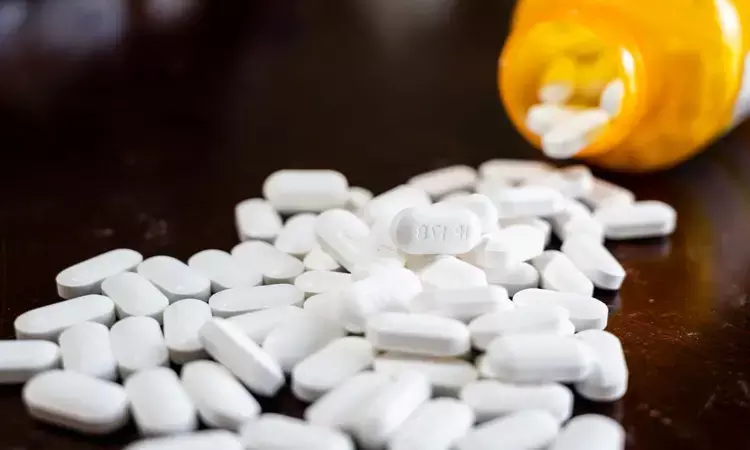- Home
- Medical news & Guidelines
- Anesthesiology
- Cardiology and CTVS
- Critical Care
- Dentistry
- Dermatology
- Diabetes and Endocrinology
- ENT
- Gastroenterology
- Medicine
- Nephrology
- Neurology
- Obstretics-Gynaecology
- Oncology
- Ophthalmology
- Orthopaedics
- Pediatrics-Neonatology
- Psychiatry
- Pulmonology
- Radiology
- Surgery
- Urology
- Laboratory Medicine
- Diet
- Nursing
- Paramedical
- Physiotherapy
- Health news
- Fact Check
- Bone Health Fact Check
- Brain Health Fact Check
- Cancer Related Fact Check
- Child Care Fact Check
- Dental and oral health fact check
- Diabetes and metabolic health fact check
- Diet and Nutrition Fact Check
- Eye and ENT Care Fact Check
- Fitness fact check
- Gut health fact check
- Heart health fact check
- Kidney health fact check
- Medical education fact check
- Men's health fact check
- Respiratory fact check
- Skin and hair care fact check
- Vaccine and Immunization fact check
- Women's health fact check
- AYUSH
- State News
- Andaman and Nicobar Islands
- Andhra Pradesh
- Arunachal Pradesh
- Assam
- Bihar
- Chandigarh
- Chattisgarh
- Dadra and Nagar Haveli
- Daman and Diu
- Delhi
- Goa
- Gujarat
- Haryana
- Himachal Pradesh
- Jammu & Kashmir
- Jharkhand
- Karnataka
- Kerala
- Ladakh
- Lakshadweep
- Madhya Pradesh
- Maharashtra
- Manipur
- Meghalaya
- Mizoram
- Nagaland
- Odisha
- Puducherry
- Punjab
- Rajasthan
- Sikkim
- Tamil Nadu
- Telangana
- Tripura
- Uttar Pradesh
- Uttrakhand
- West Bengal
- Medical Education
- Industry
Metformin and Probiotics together Enhance Gut Health and improve Type 2 Diabetes Management, suggests study

China: Metformin, while treating type 2 diabetes mellitus (T2DM), assists in improving the imbalance of gut microbiota, a recent study has found.
The study, published in the journal Allergologia et Immunopathologia, has delved into the intricate relationship between metformin, gut microbiota imbalance in patients with type 2 diabetes, and the potential benefits of probiotic supplementation. Metformin, a widely prescribed medication for managing T2DM, has been shown to influence the composition and function of gut bacteria, which in turn affects the various aspects of metabolic health.
Lu Li, Department of Pharmacy, Affiliated Renhe Hospital of China Three Gorges University, Yichang, Hubei Province, China, and colleagues conducted the study to investigate the effect of metformin on gut microbiota imbalance in patients with type 2 diabetes and the value of probiotic supplementation.
The study included a total of 84 newly diagnosed T2DM patients. The participants were randomly assigned to one of three groups: probiotics, metformin, or control, with 28 patients in each group. The blood glucose control, gut microbiota, islet function, and inflammatory factors were compared between three groups.
The study revealed the following findings:
- After three months of treatment, fasting plasma glucose (FPG), 2-h postprandial plasma glucose (2-h PG), and glycosylated hemoglobin A1c (HbA1c) were reduced in both probiotics and metformin groups and were lower than that in the control group before treatment.
- FPG, 2-h PG, and HbA1c were lower in the metformin group than in the control group. FPG, 2-h PG, and HbA1c were lower in the probiotic group than in the metformin group.
- Fasting insulin (FINS) and islet β cell (HOMA-β) -functions were dramatically increased in the same group, while insulin-resistant islet β cells (HOMA-IR) were significantly lower in the same group; FINS and HOMA-β were significantly higher, while HOMA-IR was significantly lower in both groups than in the control group before treatment.
- HOMA-IR was also lower in the probiotic group than in the metformin group after treatment; the number of lactobacilli and bifidobacteria increased in both probiotic and metformin groups than in the control group before treatment, and the number of Enterobacteriaceae and Enterococcus was lower in the control group before treatment.
- The number of lactobacilli and bifidobacteria was higher, and the number of enterobacteria and enterococci was lower in the probiotic group than in the metformin group after treatment, and the differences were statistically significant.
- Lipopolysaccharide (LPS), interleukin 6 (IL-6), and C-reactive protein (CRP) levels were lower in both probiotic and metformin groups.
- The serum LPS, IL-6, and CRP levels were lower in probiotic and metformin groups than in the control group before the treatment.
In conclusion, metformin treatment of type 2 diabetes is beneficial by reducing gut microbiota imbalance. Probiotic supplementation further regulates gut microbiota, reduces chronic inflammation, and improves insulin function and blood glucose control.
Reference:
DOI: 10.15586/aei.v52i4.1101
Dr Kamal Kant Kohli-MBBS, DTCD- a chest specialist with more than 30 years of practice and a flair for writing clinical articles, Dr Kamal Kant Kohli joined Medical Dialogues as a Chief Editor of Medical News. Besides writing articles, as an editor, he proofreads and verifies all the medical content published on Medical Dialogues including those coming from journals, studies,medical conferences,guidelines etc. Email: drkohli@medicaldialogues.in. Contact no. 011-43720751


